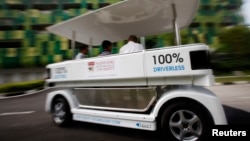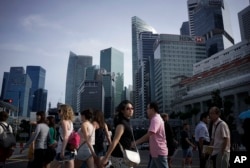Pang Kin Keong is dreaming of a paradise city, where the grass is green and the people are -- well, sitting in driverless cars.
Pang is also Permanent Secretary at Singapore’s Transport Ministry, so this is more than a dream. The government wants a city with fewer surface streets, making room for more parks, and more commuters using self-driving cars. Singapore would build roads underground and use the pods to shuttle people from the subway to their final destination.
“You must dream, you must dream,” Pang said in an interview at his office. “I want to live in a place much like the holidays and resorts that I go to once or twice every year, where the living environment is dominated by greenery. It’s safe, there are no cars zooming past me, I can go anywhere I want.”
From Silicon Valley to South Australia, companies are tinkering with driverless cars. But what sets Singapore apart is that the government now funds this research and plans to use the cars for public transit.
A few subway stops from the transport ministry, engineers have retrofitted a Toyota Alphard Hybrid to drive, sans human. On a recent, cloudless morning, the minivan navigated a public, but unclogged road, its steering wheel spinning left and right without the touch of a human hand. Outside, a toy robot rolled in front of the vehicle, testing whether it could dodge an intrusion. The robot was unharmed.
If Singapore eventually brings driverless cars online, the rest of the world could ride on its technological coattails. The island nation is well-placed for the task; it has the money and brainpower to conduct trials, as well as a powerful central government known for getting results.
Competing with Google, Uber
Private companies have turned in proposals to work with the state, including nuTonomy, which makes software for vehicles. Chief operating officer Doug Parker said the collaboration would allow far more testing than most businesses could manage alone. Singapore wants to roll out unmanned trucks and buses, too, but if it succeeds, Parker also expects firms to adapt the technology for the consumer market.
“Expanded on-road testing allows us to develop our technology more quickly, as well as prove to the buyers of the technology that it works,” he said. “And so that’s going to help level the playing field, long run. It’ll help smaller companies like nuTonomy compete with big companies like Google or Uber.”
But safety concerns are the main hurdle to becoming a society of smart cars. No matter how many scenarios are programmed into the car’s computer, it’s likely to meet an unfamiliar situation. That’s when the machine has to make decisions, and convince the public that it can minimize crashes.
“Humans and human driving is very unpredictable,” said Han Boon Siew, head of the autonomous vehicle department at the state’s Agency for Science, Technology and Research (A*STAR). “This is where the autonomous vehicle needs to continuously learn the characteristics of the urban canyon and even complex situations like road works and construction.”
The other big obstacle, Han said, is weather. His team is working to ensure the technology can withstand adverse and fluctuating conditions. Tropical Singapore experiences heavy and frequent rainfall, as well as rancid haze wafting over from Indonesia’s forest fires.
For a peek at how far the science has advanced, one only has to go to the Gardens by the Bay. The park in downtown Singapore will let visitors hop in autonomous vehicles during test drives in December and integrate them into park services by the spring, Pang said. But he thinks self-driving cars will really hit the road as early as 2025.
“If all I’m thinking about for the 2030s is a town no different from today, then that can’t be exciting enough in terms of a future that Singaporeans aspire to,” Pang said. Instead, he imagines a city-state where more people give up private cars and choose to walk, cycle, or take public transit comprised in part of driverless buses and shuttles. “I don’t think it’s farfetched. It just takes will to get there.”





